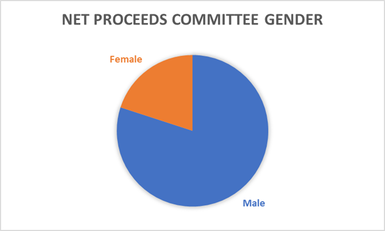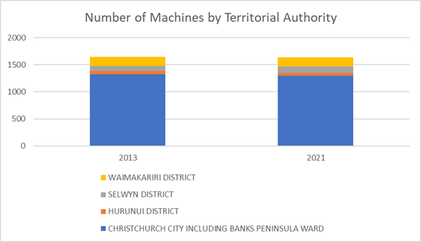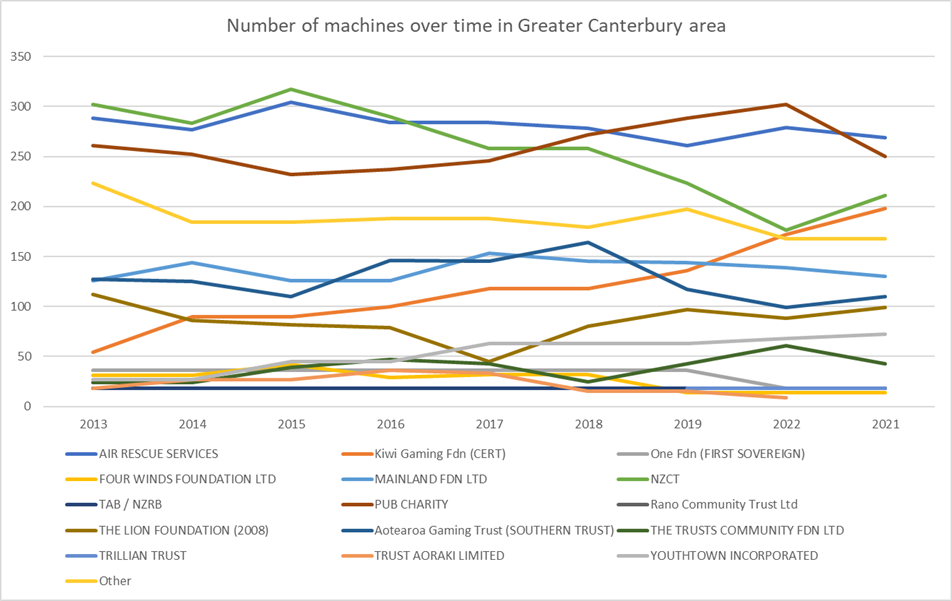So I did what any normal person would do: get the Class 4 data from the Department of Internal Affairs (DIA) and graph it.

Firstly, I have put the working men’s clubs and machines associated with those as Other. There are 14 different entities which are within that category.
Secondly, you can see that there have been a few name changes over time. I have the new name with the (old name) beside it. Unlike some who give community money away, there isn’t a huge marketing budget (and rightly so).
What this shows is that there are a lot of players in the industry. Some are regionally based, some national, some have a real sports skew, others are “for purpose” which means they are set up specifically to benefit certain third sector areas. Above we have Air Rescue, which at the start of this year has 16% of Greater Chch’s machines, and whose distributions are skewed towards Canterbury West Coast Air Rescue Trust, Mainland Foundation (with 8% of machines) to Rugby, and Youthtown (4% of machines) to, oddly enough, Youthtown.
What’s also really interesting is the growth of Kiwi Gaming Foundation (formerly Canterbury Earthquake Recovery Trust). Since 2013 their number of machines has grown by around 400%. This growth I think has come at the expense of a few of the national players. These guys do well on disclosure, and they do fund a wide range of NGOs. Click here for more about that. If I were looking for funding I’d try these guys: with this growth and their lack of brand awareness there is less competition for grant funding I reckon.
What’s also interesting is some different players active in the Canterbury market. Trust Aoraki has now exited the Canterbury market. No more funding there I’m afraid. We have The Trust Community Trust Foundation, which basically runs the West Auckland Licensing Trust, and has now gone national. I’ve looked at them in the past. We have the Trillian Trust, and a new entrant just last year, Rano Community Foundation. They have picked up one venue: after a query from me to DIA on why they don't publish their grants now they do: they look super interesting so I might do that next time. They are operating in Canterbury now and can be applied to.
I don’t know anything about the business model around venues. It must be fairly competitive out there as venues do chop and change. That said returns are all regulated. Given the number of players and some new entrants I suspect that those regulated returns still leave a fair bit of money floating around the players.
It is within the legislation that venues don’t get any say in where grants go. From the DIA’s website:
Venues: Formerly 'Sites', these are the pubs and other venues where gaming machines are located. They do not own the machines and must not be involved in decisions about who can apply for grants, who receives them or how much the grant should be.
That said, I’ve never seen any repercussions of late for infringements on this rule. So it must be all are playing by the rules.
How the decisions are made is pretty interesting. Now, I get nervous talking about diversity in decision making. To me diversity in thought is far more important than in physical attributes. However, what I’ve done is to look at all the grant decision makers within the Greater Canterbury network. And it looks like this. Around 20% of those making allocating grants to our communities are women. 6 of the 15 organisations giving money have no female decision makers. These organisations account for around 42% of machines under analysis. I don’t want to get into ethnicity, namely because it would require a few assumptions based on a photo and a name.
However, on the surface, this attribute is not something that any organisation could shout from the rooftops.
Its pretty important to get these decisions right. My previous work shows that gaming trusts account for around 50% of the contestable funding into the region: that’s $30million for third sector organisations. I’m not sure that other methods are that great either: elected officials in local government (subject to political pressures), or government appointees in the cases of community trusts or Lotteries. Check out my manifesto for a better fairly wacky idea (which just might work!). It probably wouldn’t be worse than what we have at the moment.

What does worry me is the future of this model. While, surprisingly, COVID hasn’t impacted the take too much, you can see the day when the party is over. There are plenty of other gaming options, particularly offshore. Gamblers will move to other platforms. Due to the source of the grant this sort of grant model sits fairly uncomfortably with Governments. From a grant view, sport will be hugely impacted, and there are a number of families who are dependent on that grant money to pay the mortgage.
I write about this stuff as believe that as need to understand where funding comes from, where it goes, and how it gets there. As a citizenry we allow both those supplying money and those asking for money to operate, and as a community we need to ensure we have oversight over the organisations they choose to fund. Love to talk with you if you think this is at all interesting, and if you want to dive into the data a bit more than happy to do so. Check out my website http://www.delfi.co.nz/


 RSS Feed
RSS Feed